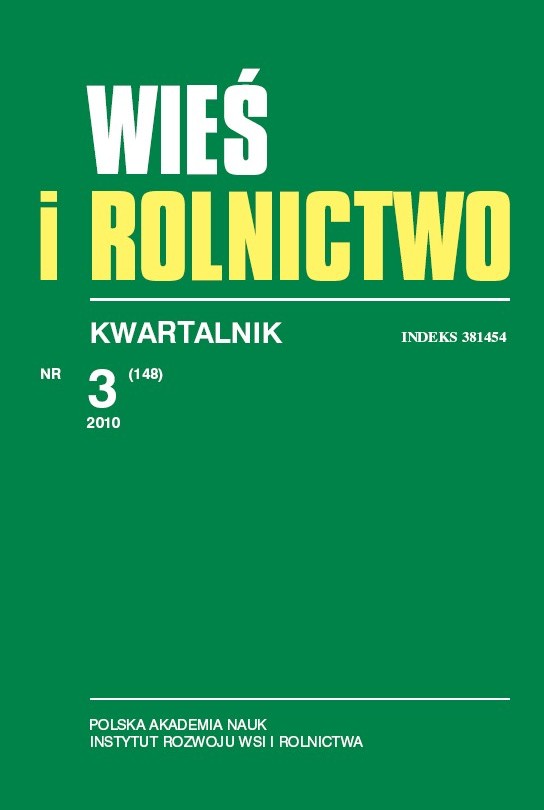EU Common Agricultural Policy After 2013 – Substantiation, Functions, Directions of Development in the Context of Interests of Polish Agriculture
DOI:
https://doi.org/10.53098/wir.2010.3.148/03Keywords:
Common Agricultural Policy, the level of assistance, CAP measures, directions of changes, substantiation, needs and expectations of the agricultural sector in PolandAbstract
This article is a contribution to the discussion about the future shape of the European Union’s Common Agricultural Policy. It refers to the paper “Common Agricultural Policy after 2013 – proposals of changes” published in “Wieś i Rolnictwo 2010/2” and it includes the author’s own reflections on the future shape of CAP. The model of CAP after 2013 is crucial not only from the point of view of the agricultural sector, but also from the point of view of the entire Polish economy. The expectations of the Polish agricultural sector towards CAP in 2014-2020 are going to be determined by the level of assistance recorded in 2013, by the sector’s modernization needs and ability to fulfil its function as a provider of public goods. The analysis conducted in the article proves that policy measures from both pillars of CAP have a fundamental meaning for Poland. The level of assistance, its common character and the preservation of equilibrium between direct support and pro-environmental and pro-modernization measures remain important.
References
Adamowicz M., 2005: Przesłanki rozwoju wielofunkcyjności rolnictwa i zmian we Wspólnej Polityce Rolnej. „Zagadnienia Ekonomiki Rolnej” 1.
Cardwell M., 2004: The European Model of Agriculture. Oxford University Press, Oxford. DOI: https://doi.org/10.1093/acprof:oso/9780199242160.001.0001
Draft Report on the Future of the Common Agricultural Policy after 2013, 2010. Rapporteur: G. Lyon. Committee on Agriculture and Rural Development.
Hardt Ł., 2008: Wspólna polityka rolna a polityka spójności w kontekście przeglądu budżetu UE. „Wieś i Rolnictwo” 4. DOI: https://doi.org/10.53098/wir.2008.4.141/03
Małysz J., 2001: Reorientacja WPR – implikacje dla krajów kandydackich. „Wieś i Rolnictwo” 1.
Model płatności bezpośrednich po 2013 r., 2010. Materiał na posiedzenie Zespołu ds. opracowania koncepcji i propozycji warunków oraz zasad WPR po 2013 roku. Departament Programowania i Analiz MRiRW, Warszawa.
Pawlak K., Poczta W., 2010: Potencjał polskiego rolnictwa pięć lat po akcesji Polski do UE jako przesłanka jego konkurencyjności. „Wieś i Rolnictwo” 1. DOI: https://doi.org/10.53098/wir.2010.1.146/01
Poczta W., Pawlak K., Kiryluk-Dryjska E., Siemiński P., 2007: Perspektywy polskich gospodarstw rolnych w europejskim modelu rolnictwa. Roczniki Naukowe SERIA IX, 2.
Poczta W., Czubak W., Pawlak K., 2009: Zmiany w wolumenie produkcji i dochodach rolniczych w warunkach akcesji Polski do UE. „Zagadnienia Ekonomiki Rolnej” 4.
Poczta W., Czubak W., Sadowski A., Siemiński P., 2010: Scenariusze płatności bezpośrednich w krajach Unii Europejskiej po 2013 roku. Maszynopis. Poznań.
Tomczak F., 2009: Ewolucja wspólnej polityki rolnej UE i strategia rozwoju polskiego rolnictwa. IERiGŻ-PIB, Warszawa.
Wilkin J., 2009: Uwarunkowania rozwoju polskiego rolnictwa w kontekście europejskim i globalnym. Implikacje teoretyczne i praktyczne. W: Polityka gospodarcza a rozwój kraju. Red. U. Płowiec. PTE, Warszawa.
Zahrnt V., 2009: Public Money for Public Goods: Winners and Losers from CAP Reform. „ECIPE Working Paper” 8.
Downloads
Article file downloads
Pages
How to Cite
Issue
Section
License
Copyright (c) 2010 Wieś i Rolnictwo

This work is licensed under a Creative Commons Attribution 4.0 International License.










